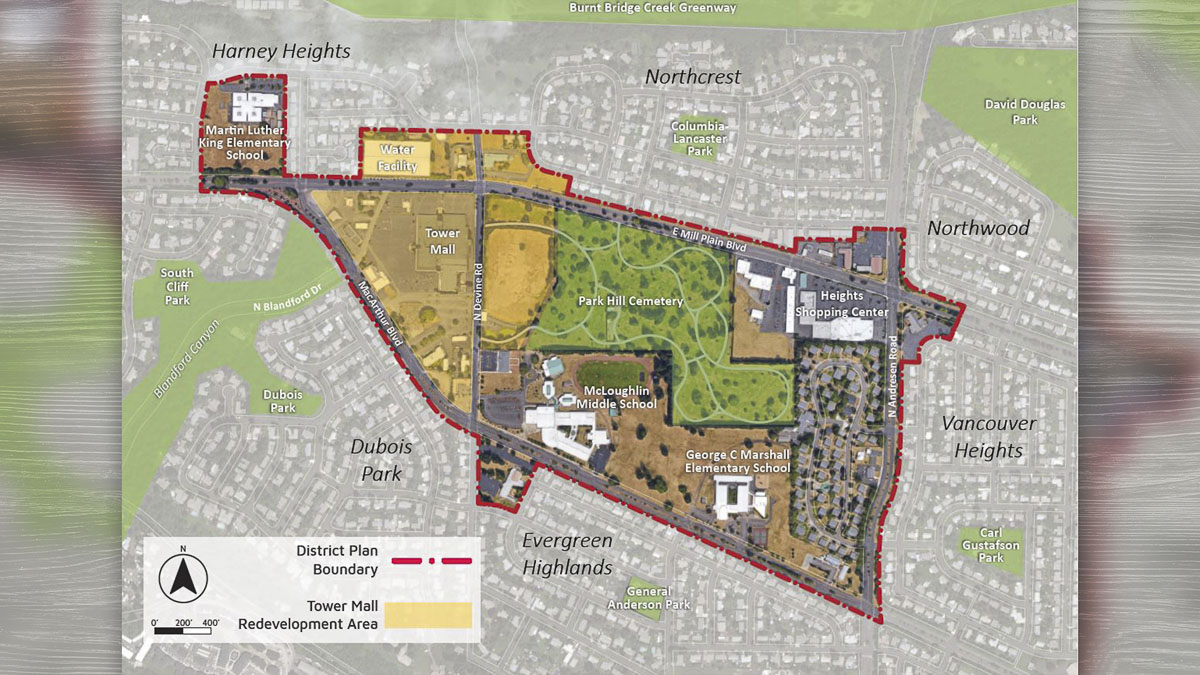
All three selected development teams have extensive experience with similar large-scale affordable housing and mixed-use projects like the Heights District
VANCOUVER – On Monday (Aug. 26), city of Vancouver staff and the Heights Community Investment Committee (HCIC) presented their recommendations for development teams to City Council for the first three city-owned development sites in the Heights District, located at Mill Plain Boulevard and Devine Road, identified as Sites B, C and P.
The development teams were selected from a pool of applicants who responded to a Request for Proposals issued in March. After a thorough review process, the HCIC selected the following lead developers:
City Council members supported the HCIC’s selections allowing staff to proceed with negotiating exclusive negotiation agreements (ENAs) with the development teams on each city-owned site.
“Getting the go-ahead from City Council to begin negotiating the ENAs that will govern each of the projects is a vital and necessary step in implementing the Heights District Plan,” said Height District Project Manager Amy Zoltie. “Each development team has confirmed that they can proceed expeditiously on this project, and all three teams have said in their proposals that they would be in a position to start construction in 2026, subject to securing financing.”
All three selected development teams have extensive experience with similar large-scale affordable housing and mixed-use projects like the Heights District. They have also demonstrated a commitment to equitable development through past projects and align with the goals outlined in the Heights District plan.
The HCIC was established in 2023 to guide the development of the Heights District as recommended in the Heights Equitable Development Plan. The committee consists of Vancouver residents with experience in affordable housing development and financing and representatives from Central Vancouver businesses and organizations.
City staff will begin negotiating the ENAs with each selected team and return to Council in September to seek authorization for the city manager to execute the ENAs. Deal terms are anticipated to be negotiated by the end of the year with the presentation of the development agreements planned to go before the City Council for its approval in Q1 2025.
View the preliminary project renderings for Sites B, C and P.
Learn more about the Heights District Plan.
Information provided by the city of Vancouver.
Also read:
- POLL: Should Washington Raise the 1% Cap on Property Tax Increases?Clark County Today’s weekly poll asks whether Washington lawmakers should raise the current 1% cap on annual property tax increases.
- The Study of Sports Podcast, April 10, 2025: Some spring sports talk, including the challenges of hosting large track and field meets, plus an epic Mariners fandom storyIn the latest episode of The Study of Sports Podcast, Paul Valencia is joined by Cale Piland and Tony Liberatore for a mix of local sports coverage and one unforgettable Mariners fandom story.
- Public memorial for former Vancouver Mayor Royce PollardA public memorial will be held April 11 in Vancouver to honor former Mayor Royce Pollard and his lasting contributions to the city’s growth and development.
- Letter: The more you knowCamas resident Anna Miller criticizes a recent remark by Rep. Jasmine Crockett as racist and demeaning, and outlines Republican contributions to civil rights history in her letter to the editor.
- Letter: City vehicles speeding on the highwaysVancouver resident Peter Bracchi raises concerns about excessive speeding by city-owned vehicles, based on GPS data received through a FOIA request.
- Can $10 tolls be coming to the Interstate Bridge?Rep. John Ley examines a proposed Washington House bill that would double borrowing for the Interstate Bridge Replacement and potentially lead to high tolls affecting Southwest Washington drivers.
- Senate Republicans: WA property taxes will skyrocket under bill to remove annual capSenate Republicans are opposing Senate Bill 5798, warning it could sharply increase Washington property taxes by removing the long-standing 1% cap.











